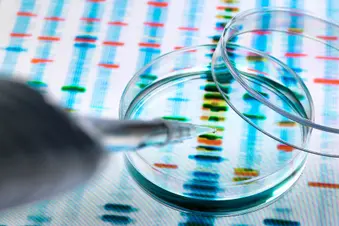
Most non-small-cell lung cancer is caused by smoking, but your genes may also help determine your chances of getting the disease. Lung cancer is when cell growth in the lungs becomes abnormal and cancer cells are created. A gene mutation, or change, can make this happen.
Cells normally divide, grow, and may die, at set times. But a gene that changes in a certain way can trigger cells to continue to divide and grow, even when they shouldn’t. This out-of-control cell growth can lead to cancer.
Sometimes, a mutated gene that should make sure cells divide slowly or stop won’t, or it won’t make sure that cells die when it’s time. All this can also lead to cancer.
Some people have genes that mutate during their lifetimes for different reasons, and those changes can raise their chances of lung cancer. Other people inherit changed genes from their parents. Still others have cells that change for no apparent reason.
There are a few different ways that genes -- tiny pieces of your DNA -- can mutate and lead to non-small-cell lung cancer.
Gene Changes Caused by Lifestyle
Most gene mutations that lead to lung cancer happen because of things you’ve been exposed to. Tobacco is the most common cause of genetic changes to lung cells, but it isn’t the only one.
Your genes could change if you come into contact with asbestos or radon on a regular basis. It can also happen if you deal regularly with air pollution, or if you spend a lot of time around certain metals or chemicals, like diesel exhaust.
Secondhand smoke can also cause the genes in your lungs to mutate. You don’t need to smoke to raise your odds of lung cancer, if you spend long periods of time in enclosed spaces with people who do.
Gene Changes That You Inherit
It’s possible to have a genetic mutation passed down to you that can make you more likely to get lung cancer. But it’s less common than gene changes caused by other things. (Lung cancer does run in some families, but that doesn’t happen very often.)
Some people who have an inherited gene mutation in one of their chromosomes may have more of a chance for the disease, even if they don’t smoke. Other people are less likely to be able to clear certain cancer-causing chemicals from tobacco out of their systems. Still others may get a mutation that breaks the system that repairs their DNA. This may lead to more mutations and cancer.
If You Have Lung Cancer
Knowing what genetic mutations you have may be helpful if you’ve been diagnosed with non-small-cell lung cancer. Some treatments target some genetic changes and are more likely to be effective tools to fight the disease.
Other treatments are less effective against some genetic mutations, so your doctor might not try that treatment if you have a certain mutation. For these reasons, your doctor may test your genes to see if they should prescribe or avoid certain drugs.
Genetic tests for non-small-cell lung cancer may not be offered by every doctor or hospital, but you may want to ask for a tumor marker test if you’ve been diagnosed.
Show Sources
Photo Credit: Westend61 / Getty Images
SOURCES:
American Cancer Society: “What causes non-small cell lung cancer?” “Oncogenes and tumor suppressor genes.”
National Institutes of Health Genetics Home Reference: “Lung cancer.”
Memorial Sloan Kettering Cancer Center: “Lung Cancer Genomic Testing (EGFR, KRAS, ALK).”
National Cancer Institute: “Understanding laboratory tests.”